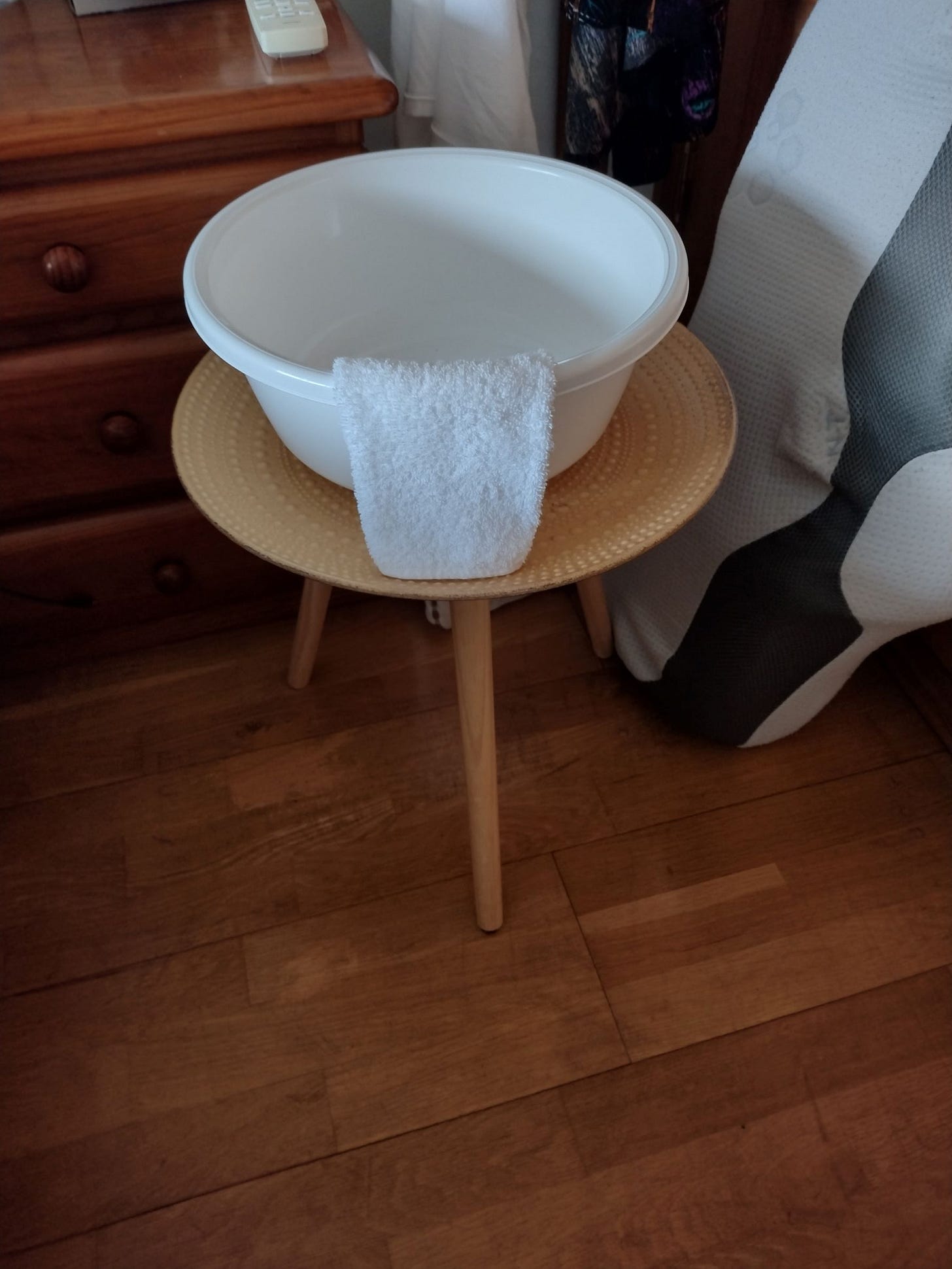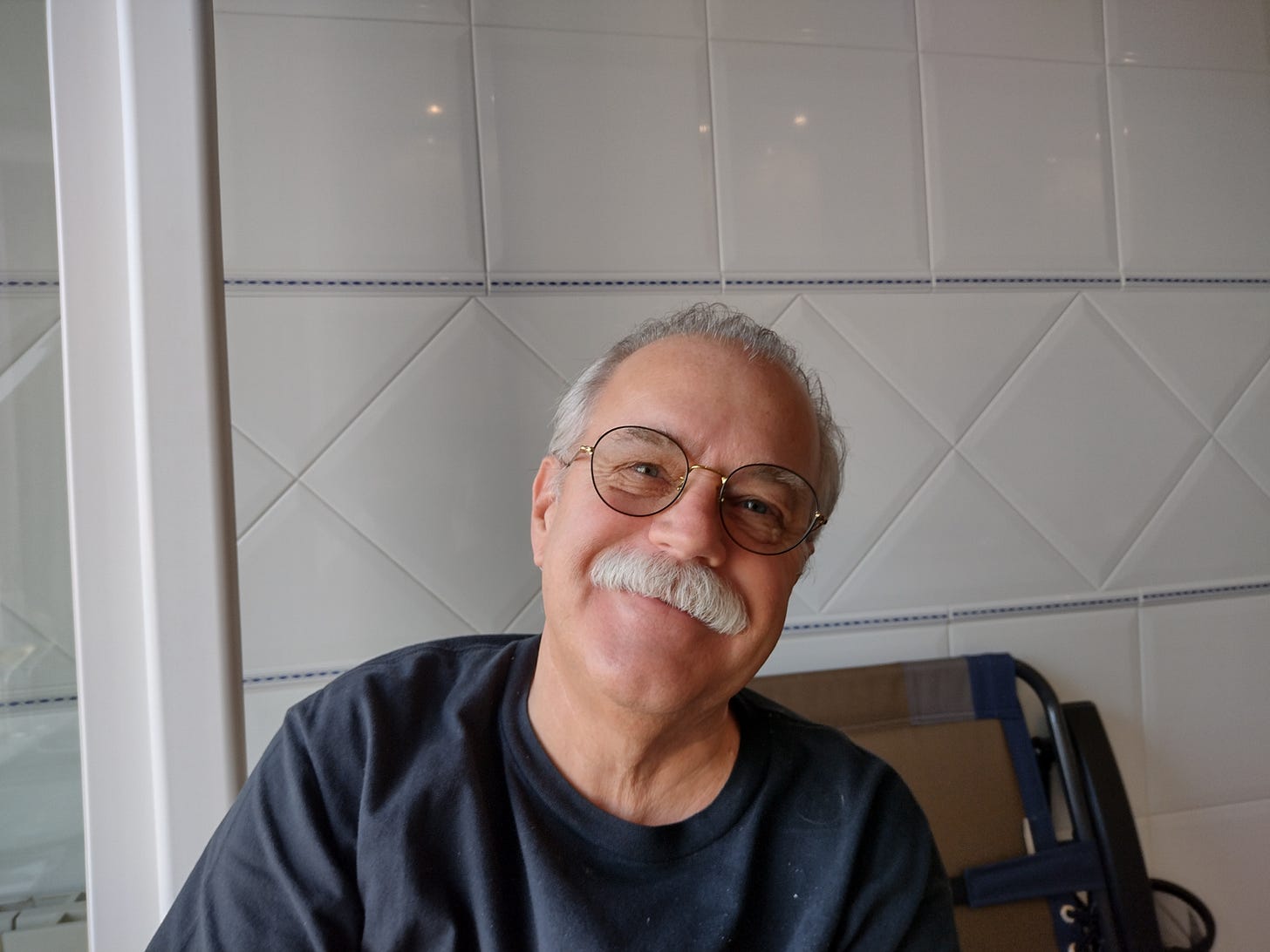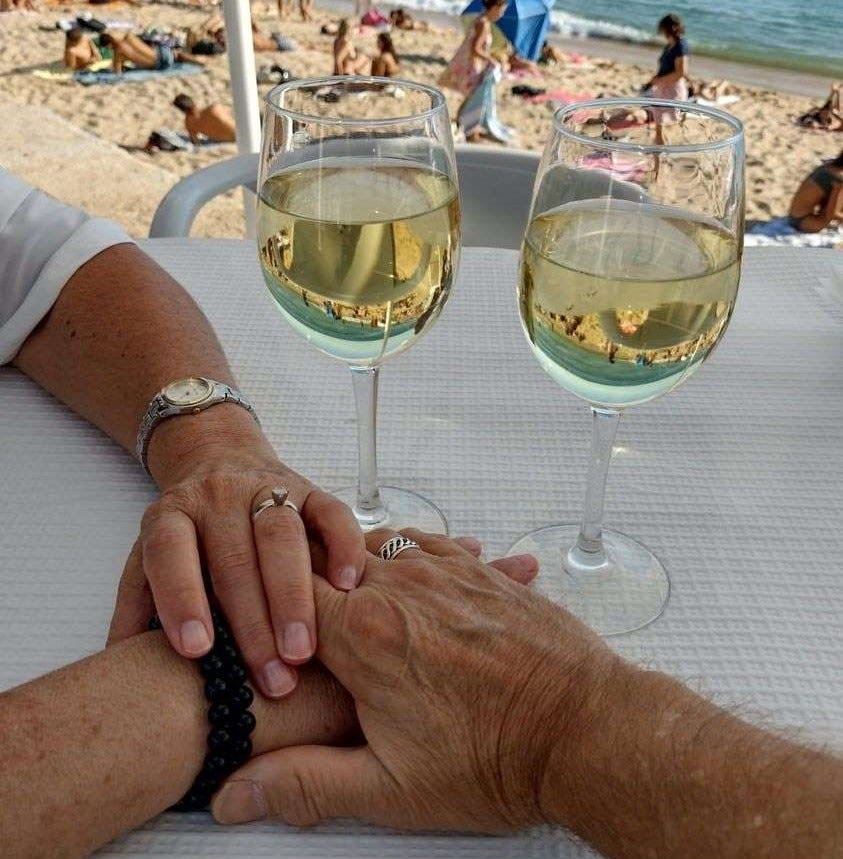When life starts going sideways. Literally.
Our first healthcare crisis in Portugal.

For two people who normally don’t get sick, the last few months here in Portugal have more than made up for that. In June, 2022 Paul and I both contracted a strain of the BA variant of Covid. Despite being fully vaccinated and boosted, we got it. And they were not mild cases. In the past, any time I have had a bad cold or flu, it hits my respiratory system and I cough hard for a few weeks. This time around, I thankfully didn’t have much of a problem. But Paul did. And that surprised us both because he never gets a cough that lasts more than a day or two. His cough lasted over 3 weeks – night and day. After we finally recovered, we were tired and had no energy to go out and do anything – plus it was summer and hot outside. So, for most of June and part of July, we stayed home. I wrote a lot. Did my fair share of online shopping. And we took naps. We felt so old and boring.
By mid-July, we were perking up! We traveled to Coimbra to meet with our Portuguese tax accountant and spent a few days exploring the city. We met friends for lunch, cocktails, or dinner. We made plans for socializing and accepted party invitations. We were getting back in the groove! And then, everything started going sideways. Literally.
One day in early August, Paul said that one of his ears seemed ‘blocked’ and his hearing was off – he couldn’t hear in that ear. He sounded nasally so we chalked it up to allergies. For many years, he has had bad hearing in one ear and tinnitus, (which he says doesn’t bother him as he blocks it out). Having had similar symptoms in the past, and having seen several top specialists in Scottsdale, Arizona who couldn’t really diagnose what the problem was other than hearing loss and tinnitus, (even though Paul had every test imaginable), we hoped that an over-the-counter antihistamine would take care of it this time. It did not.
Then vertigo happened.
Paul started to get dizzy any time of the day or night and for no apparent cause. The dizziness got bad – to the point where he lost his balance, couldn’t stand up and felt the room spinning and going sideways. He couldn’t focus or see straight. It took all the strength I had to get him into bed to avoid having him fall flat on his face or hit his head on the floor. And then the nausea would come (I was glad I had purchased a basin for doing some handwashing of clothes). Sometimes these episodes of vertigo would last for well over 2 hours. He had to lay still on the bed, with his eyes covered (and the basin very close by). We didn’t want to risk going out anywhere. This was vertigo and it had us scared.
After a few days, when the symptoms didn’t subside, we had to take some action. Thankfully, we had recently joined Serenity Portugal. If you’re unfamiliar with Serenity, it’s a medical concierge service geared toward foreign residents in Portugal. For a reasonable annual membership fee, you are assigned an English-speaking case manager (registered nurse) who can find specialists and physicians in your area that also speak English, set up and book appointments, speak on your behalf with physicians, pharmacists, clinics, and hospitals, offer support, and review your private health insurance coverage, among other things. It’s like a lifeline to all things medical in Portugal which for us, means that we don’t have to try to figure out healthcare in a foreign country on our own, especially in an emergency.
Our first healthcare experience in Portugal.
Within 48 hours, our Serenity case manager had set up an appointment with an English-speaking ear, nose and throat specialist at CUF Cascais, one of the private hospital networks in Portugal. We have private health insurance in this country and can access both the private and public healthcare systems. The CUF network of hospitals and healthcare professionals are part of our private health insurance network so we only pay a small co-pay for these types of visits.
This was a new experience for us. We weren’t even sure where this hospital was located in Cascais! And I wasn’t even sure that I could get Paul to this appointment if he was experiencing an episode of vertigo. It was the first time I had felt frustrated and completely helpless not having a car. But, with vomit bags, eye mask, bottled water, and a lot of stress in hand, we hired an Uber to take us to the hospital and we arrived without any dizzy issues.
The system at the hospital was very efficient. We went to the first floor and at a kiosk, selected the exams option. A little paper ticket with a number came out and we sat in a large waiting room with monitors on the wall to await our turn to go up to the reception desk to check in for our appointment. Since this was our first time, Paul had to register with the hospital which didn’t take very long to do. He had to show his residence card, his Portuguese health number, and insurance card. We were then asked to go down the hallway, have a seat, and wait near door number 3.
There was another monitor in this hallway displaying our ticket number. When the ticket number blinked and made a bell ringing sound, we knew it was our time to go through door number 3. We wouldn’t have really known this, but we observed other people doing this, and I did ask an attendant if this was the protocol.
Once inside door number 3, we met with the specialist. This was a large room with a desk for the doctor, chairs for the patient and family members, and examination equipment. The doctor was attentive, very professional, listened to Paul’s symptoms and his history of hearing loss and tinnitus, and asked some questions. He said that Paul’s symptoms were all indicating inner ear disease. He explained in detail what inner ear disease was, and why he thought Paul might be experiencing it. He examined Paul and prescribed two medications that he felt would alleviate the vertigo within a few days. He also ordered a hearing test which we already knew would show significant hearing loss in one ear. We both came away feeling that we had been given a better explanation of this condition than we had ever received from all the specialists in Arizona.
When we were finished with the exam, we went back out into the large waiting room, took another ticket at the kiosk selecting the option for paying bills and making appointments and waited our turn to go up to the reception desk to pay the co-pay (and yes in case you’re wondering, all the staff at the reception desk spoke English).
We were feeling relieved that we were on the right track, but it didn’t last long. A few days went by, and the medications didn’t really seem to be very effective. We decided to wait a week to see if there was improvement. But each day, Paul continued to experience at least one episode of vertigo – many that lasted at least two hours.
An alternative approach.
I started to think about an alternative approach. This was prompted by an acquaintance who mentioned that a friend who had vertigo had benefitted from a chiropractor. I’m familiar with chiropractic medicine but I’m also familiar with osteopathic medicine and feel more comfortable with osteopathy having had personal experience in the past with this type of treatment. I began to wonder if osteopathy would help Paul’s vertigo.
I reached out again to our Serenity case manager and asked if Portugal had either chiropractors or osteopaths who practiced spinal manipulation, since I really didn’t know. Within 24 hours, she had a name and an appointment for us with an osteopath at a private clinic in Cascais. Our case manager said that she had personally interviewed this English-speaking doctor who had experience working with vertigo patients. She felt confident that he might be able to help.
This clinic in Cascais was in an upscale neighborhood. There’s a pharmacy with a drive-through next door. A variety of doctors have offices in the clinic including osteopaths, cardiologists, urologists, and gastroenterologists. The front office staff spoke English as well. Paul had to fill out a form (nothing crazy like the ‘paperwork’ we used to fill out at doctor’s offices in Arizona). Since this was a private clinic that was not in our health insurance network, we already knew we would have to pay out of pocket.
We waited for our appointment in the waiting room, and when Paul was called, the osteopath met us at the top of the stairs (there was also an elevator if you were not able to take the stairs). He was cordial, friendly and asked a lot of questions. He reviewed Paul’s medical history and he concurred with the ear, nose, and throat specialist that indeed the vertigo was due to inner ear disease. He felt he could successfully treat Paul and that with a few weekly visits, Paul would be feeling better.
He then began to examine Paul and work on his neck and shoulders. We spent one and a half hours there. The doctor took his time, explained what he was doing and why, and both Paul and I felt very good about this experience.
We felt even better when we returned home. That afternoon, Paul had a mild vertigo episode and then again on the following day – nothing as severe as before (no basin needed). The following week, we returned to the osteopath who was pleased with Paul’s progress and worked on Paul for another hour.
We returned home and hoped for the best. Paul experienced only very mild dizziness that lasted for a second and then went away. This continued for a few days and then…nothing. No dizziness, no nausea! We were cautiously optimistic but still did not make any social commitments or venture out other than taking out the trash, and I still would not remove the basin from next to Paul’s side of the bed. Then, last week, we returned for a third appointment with the osteopath. He was pleased with Paul’s progress and worked on his neck, shoulders, and spine for another hour. He gave Paul the green light to start going out and encouraged us to start socializing again. He also said that he didn’t need to see Paul for another three weeks but that he was always available by phone if Paul had any problems or concerns.
Traditional or alternative?
I think it depends on the situation. Some illnesses respond better to traditional methods of treatment than others and I’m not trying to make judgements here. I’m simply describing our personal story about the health crisis journey we experienced in Portugal.
In Paul’s case, he continues to take the medication prescribed by the ear, nose, and throat specialist since he feels it does help with the nasal and head congestion, and perhaps at some point, the vertigo would have subsided on its own. But, by being open to alternative methods of treatment, the vertigo seemed to subside much more quickly, giving both Paul and I our lives back. And strangely enough, although he’ll never have perfect hearing in one ear, some of that hearing has started to return.
Both Paul and I have good feelings about the healthcare system in Portugal. Some may consider this health crisis mild, and compared to others, I would have to agree. But the level of care, the professionalism, the willingness of the doctors to listen, made favorable impressions on both of us. We’re not looking forward to getting sick any time soon, but if we do, we know we’ll be in good hands.
Thank you for reading Our Portugal Journey. This blog is a subscriber supported publication but has no paywall – in other words, you can subscribe for free and receive all the content. However, if you find my content valuable, please consider becoming a Supporting Subscriber for a nominal fee either on a monthly or annual basis right here. Just want to buy me a glass of wine? You can do that here.
Until next time…
Obrigada!
Carol.







Carol, the information that you're providing without expectations is so valuable and beyond the benefit that you know to be true. While others are charging for common knowledge you and Paul have become beacons of humanity and I thank you for this.
This process is filled with unfamiliar processes with sequence of events that could be benign or filled with moments that can turn a decent day into misery. Happy New Year and may you be blessed with the same warmth and caring as you provide. Kudos!
We are very happy with Paul's recovery. We wish him the best and expect him to be back to being 100% normal, very soon! Also, it must have been very hard on you Carol during these tough times. You are a tough & resilient person!